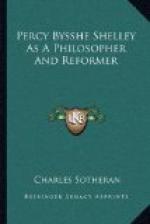“A name endeared by its peerless bearer to every lover of the human race, ’For a nation to love liberty, it is sufficient that she knows it to be free; it is sufficient that she wills it.’”
His other Dublin pamphlet, A Proposal for an Association of Philanthropists, consists of remarks of the same character as the former, but he gives a summary of the French Revolution, which he endeavors to clear from the slurs which had been cast thereon. The information has come down to us through one of Shelley’s biographers, that he spoke at several meetings in Dublin. At the one in which he made his first appearance in public he aroused a large assembly to enthusiasm by his fervid eloquence, and yet, notwithstanding all his efforts, his toleration unfortunately became the great stumbling-block in his attempts on behalf of Ireland, for we learn that at another meeting of patriots:
“So much ill-will against the Protestants was shown, that Shelley was provoked to remark that the Protestants were fellow-Christians and fellow-subjects, and were therefore entitled to equal rights and equal toleration with the Papists. Of course, he was forthwith interrupted by savage yells. A fierce uproar ensued, and the denouncer of bigotry was compelled to be silent. At the same meeting, and afterward, he was even threatened with personal violence, and the police suggested to him the propriety of quitting the country.”
By many it has been said that Shelley was unsuccessful in his self-imposed task, but he was simply before his time, and no wonder, when we remember the condition of Ireland at the time of his visit.
We know to-day that much of what he demanded has been conceded to Ireland by liberal English governments. An alien Church has been disestablished; public education, Catholic emancipation, and a good deal more, has been given. In the late repeal movement, the young Ireland party, the Fenian organization, and the present Home Rule agitation, we find, as Shelley wished, Catholic and Protestant working arm in arm, their colors being an admixture of orange and green—a healthy sign.
Those who dislike this noble people—for the name is legion of those who are fond of shouting “No Irish need apply”—I would recommend to think calmly over Irish history, to remember the frightful outrages put upon this generous, warm-hearted, and impulsive race for centuries, and read up Froude, Mitchell, Goldwin-Smith, McGee, Moran, and other Irish historians.
We know what the Irish are capable of, and that in Ireland, as here, after a generation or two of education, the old theological belief becomes by a gradual process less and less strong.
On September 6th, 1819, a red letter day was added to the English calendar, through the slaughter by cavalry of a number of unarmed men, who were agitating, peaceably, for the rights of labor. This is known to posterity as the “Peterloo Massacre,” and happened in Manchester, on the site of the present superb Free Trade Hall, erected by the Free Traders to commemorate the ultimate triumph of their cause over the capitalists, who, in the manufacturing districts, were, until a few years back, always aided by the military in putting down strikes or demands for increase of wages.




